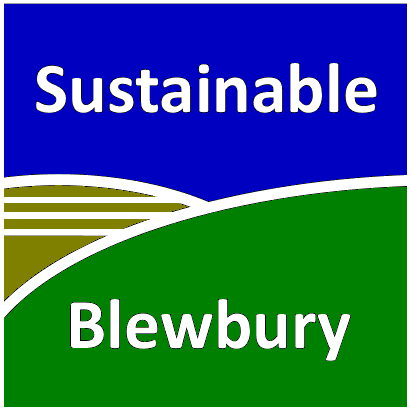
The Food and Farming theme supports and promotes local food production and marketing in order to reduce food miles, as well as encouraging fair trade and healthy eating. We also encourage reduced consumption of meat to reduce methane emissions.
Food and farming
The best ways to reduce dependence on oil and minimise carbon emissions are to:
- Shop locally
- Produce food in and around Blewbury – we list some local producers below
- Use locally grown products whenever possible
- Promote growing methods that aren’t dependent on oil-based chemicals and fertilizers, and that minimise the use of oil-fuelled machinery
- Eat less meat (most notably beef and lamb) to reduce methane emissions
And … whenever possible, try to shop ethically!
Many of our events have a local food theme. We welcome ideas about how Blewbury could develop along these lines and what your views are. If you have thoughts about this, would like to get involved, or just want to be kept informed by email about what's going on please contact us at info@sustainable-blewbury.org.uk
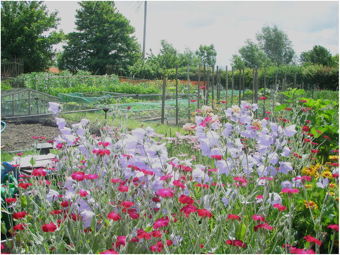
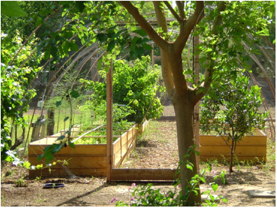
Blewbury Garden Market (BGM) (No longer a project of Sustainable Blewbury)
Note: Sustainable Blewbury became a charity in summer 2023. Under charity rules, Blewbury Garden Market cannot be part of Sustainable Blewbury, so to continue it will be a separate, standalone projct. Below we have a brief summary of its 13 years as part of Sustainable Blewbury, and for convenience a reminder of useful web links.
In 2010 we started a weekly produce stall, on the forecourt of Blewbury Service Station/Shop, every Saturday morning (photos below) from spring to autumn. It is for people wishing to sell surplus garden and home produce, including plants and seedlings, fresh fruit, vegetables, cut flowers, preserves and cakes, etc. It ran from May through September, and was popular and successful – nearly everything brought was sold.
The stall had a second successful season in 2011, starting earlier in May and going through mid-October. In 2012 the stall did better by far, despite the very unfavourable growing conditions due to record bad weather. Contributing to this were local honey and regular supplies of interesting home-made bread from the newly formed Blewbury Bakers group (now gone). We received a grant from RWE npower’s Didcot Power Stations to buy a sturdy new tent and tables to replace borrowed ones. In 2013 we had our an even better summer, with good crops of produce as well as lots of bread, cakes, jam, honey, etc.
The successful 2014 season began at the Blewbury Green May Fair on 10 May, and continued every Saturday. The last session of 2014 was part of our Apple Day celebration at the Red Lion in October. In 2015, 2016, 2017 and 2018 we continued, with yet more interesting produce (including some from our permaculture community orchard garden).
The summer of 2019, our tenth year, broke records for turnover. We had some new producers bringing produce, including the school gardening club, lots of local honey, and a wide selection of cakes in addtion to bread, jams, etc.
In 2020, due to the pandemic, we were only able to operate (very successfully) in September. In 2021 we started in mid-April so we could sell more garden plants. The new Blewbury Bread Company sold its excellent sourdough loaves and pastries on our stall and helped us to smash all previous records.
The stall had become an excellent place to pick up fresh, locally produced and sometimes unusual items at low prices. In 2019 we got a nice new canopy for our gazebo. The helpers rota may be found here.
During the winter 2012–13 we started Blewbury Garden Market Extra on Saturday mornings at the Post Office – this was repeated successfully for several years. At the Post Office we still occasionally sell preserves as well as early vegetables such as rhubarb.
Information for producers (for convenience)
- Please bring produce from 9.00 to (if at all possible) 9.15 am, Collect unsold produce at 11.15 am.
- Two sheets can be downloaded: a short guide for producers, and a form to keep track of your produce and sales. Please fill in the form in advance, to save time and minimise confusion. Be sure to label your goods with the price and your name.
- Prices are set by the producer; the stall keeps a 10% levy to cover our overheads.
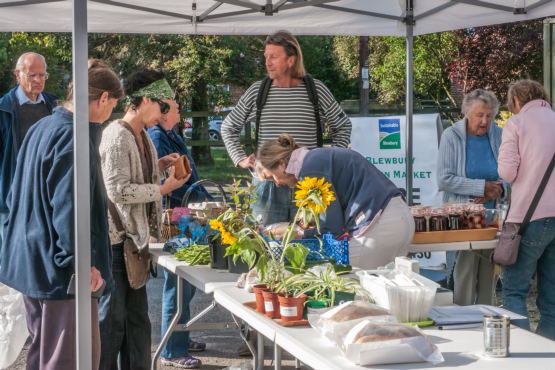
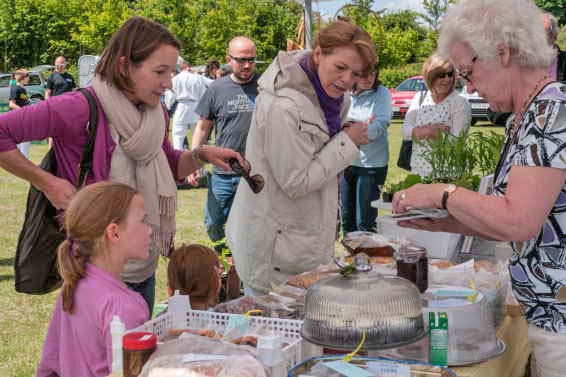
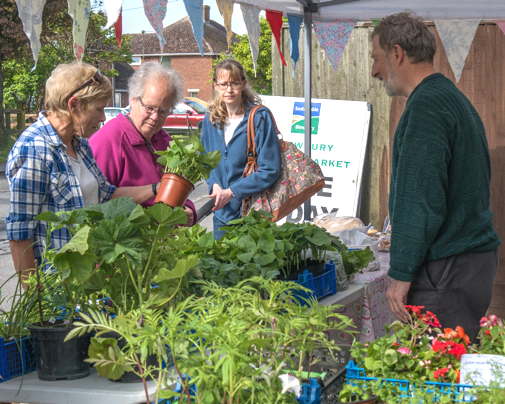
Permaculture is based on a philosophy of cooperating with nature and facilitating the development of a system that is self-sustaining and self-supporting. By observing natural systems it is possible to produce an environment that is rich in biodiversity, needs very little maintenance, and which leaves the environment enriched rather than depleted. We have started a permaculture pilot project to use these methods on a plot of land at the edge of Blewbury, and have been developing a small orchard garden.
We started by planting a shelter-belt hedge around the two sides of the field with more than 400 plants in February 2011.
The next stage was to plant some fruit trees and bushes, starting in October–December 2011 by mulching the upper area of the field to suppress the grass and to enrich the soil. In December 2011 we planted a dozen fruit trees, including (among others) cherries, medlars, quince, gages, pears and apples. These are underplanted with gooseberries, redcurrants, blackcurrants and other soft fruit, plus perennial herbs and other ground cover.
In November–December 2012 we planted a further ten fruit trees (two varieties of pear, three of plum, damson, crab apple, cobnut, sweet almond and black mulberry) as well as a low rosa rugosa hedge (large rosehips) across the middle of the field. In March and April 2013 we planted lots of autumn raspberries, asparagus, and a wide variety of perennial herbs and other plants to extend the ground cover.
In February 2013 Lawrence Graham worked and guided us to construct a living willow shelter. It is growing a covering of green leaves, and is a most attractive place to sit in: to discuss the work on the site, to view the downs to the south, or just to relax and think.
In 2013 we had some soft fruit to sell at the Blewbury Garden Market: gooseberries and currants, as well as blackcurrant jam, courgettes and french beans. The various herbs have attracted very large numbers of bees and butterflies – many varieties that were hardly seen in 2012 have re-appeared.
In December 2013 we planted more trees (two cherries, a cooking apple, a plum, a greengage and a flowering lime) and various soft fruits (blackberries, tayberries, jostaberries, boysenberries and kiwi berries).
In early September 2014, after a good season with various trees and bushes beginning to produce useful quantities of fruit, we had a very informative and enjoyable open day to show people what we are doing.
In January–March 2015 we had our first really big crop – well over 20 kg of Jerusalem artichokes (we’d had some the previous February). Most were sold via BGM Extra at the Post Office. In the spring we produced and sold large quantities of rhubarb, both fresh and as jam. In May we had an very interested and enjoyable visit by about 30 people from Abingdon Carbon Cutters and Green Appleton. During the summer and autumn we sold a lot more produce and preserves – see our permaculture page for details. Income from sales more than covered our running costs.
In 2016 we added a few new bushes, but mainly it was a year of consolidation and increased yield in many cases, especially soft fruit. We started and ended the year with Jerusalem artichokes. In spring we had lots of rhubarb, then globe artichokes. A lot of the soft fruit was made into jam. 2017 was more of the same. In 2018 a new development was a big crop of quinces, made into jelly, membrillo paste and other interesting recipes. We also added two Asian pear trees, and replaced two plum trees that had died. 2019 was a mixed year, with good crops of some things and poor crops of others due to frost in spring, hungry blackbirds and unusually varied weather.
2020 saw litttle progress due to Covid and other problems. In 2021 we decided to mow less of the grass, and had good crops of soft fruit, quince and medlars (which were turned into jelly).
There is more information on our permaculture page, a diagram (pdf) of what we have planted, a description of our trees (pdf), and a photo gallery of the planting of the shelter-belt hedge and the fruit trees and bushes.
Photos
2011: A winter view of how the 0.44 acre downland plot started out and
a view of part of the new hedge are shown.
2012: Newly
planted beds are shown in the 3rd photo, an early summer view of soft fruit
etc. in the 4th, and a general view in the 5th.
2013: The
willow shelter being built, growing leaves in late May, a Chalk Hill
Blue butterfly, and a view in August with our new sign.
2014: Trees
in blossom early spring; globe artichokes; open day.
2015: Jerusalem artichokes and our almond
tree in blossom.
2016: A frosty morning on our rosa rugosa
hedge.
2018: Autumn colours, and note the growth of the trees.
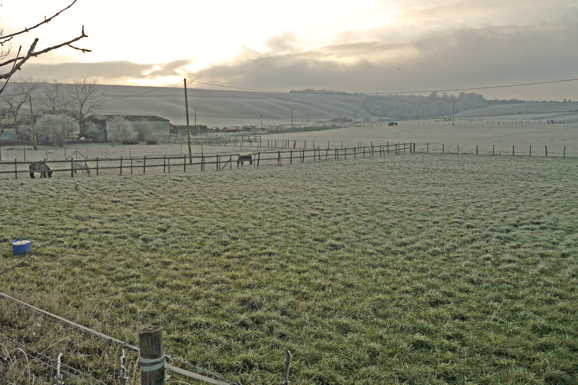
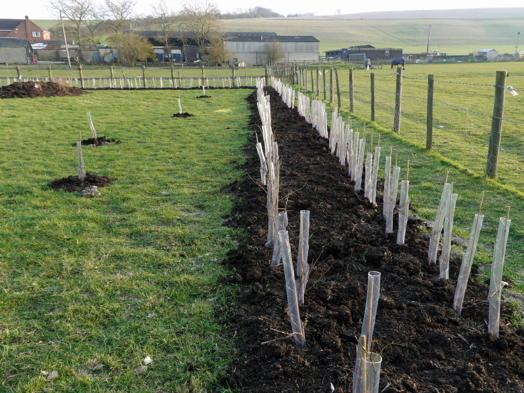
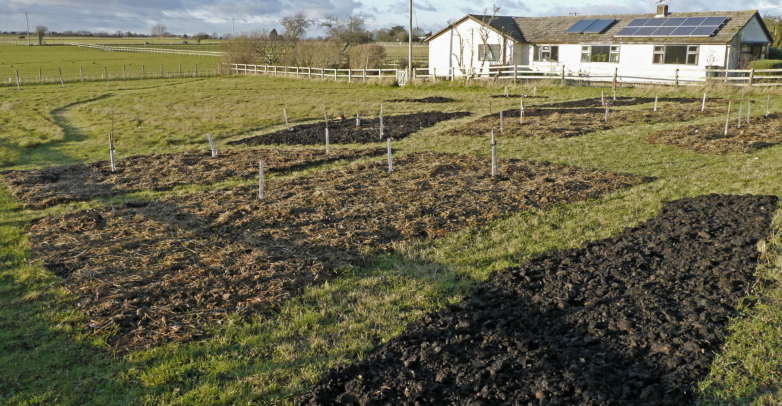
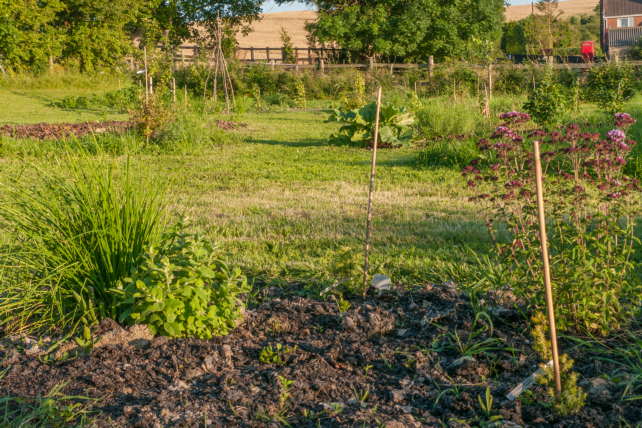
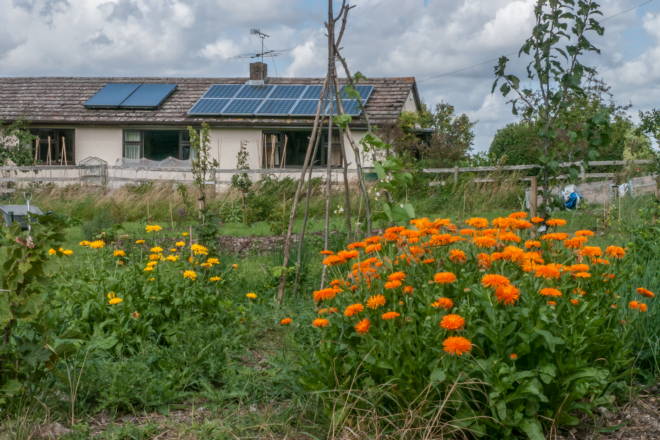
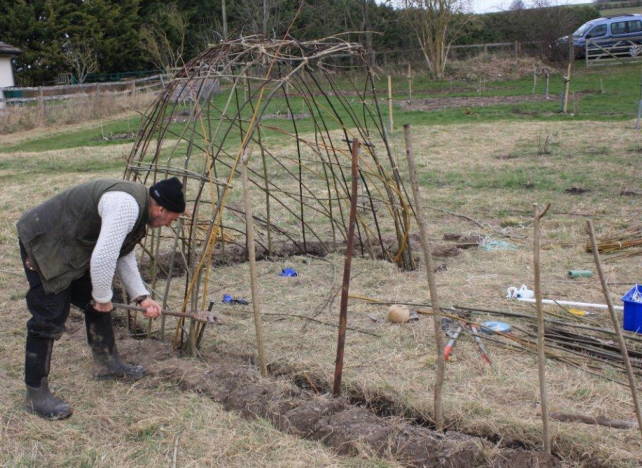
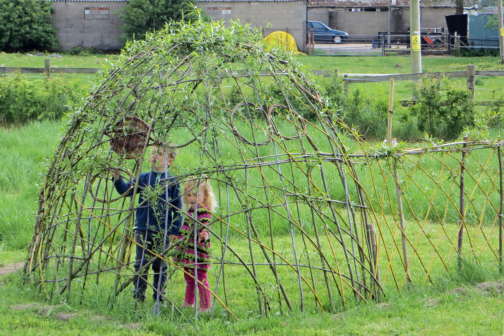
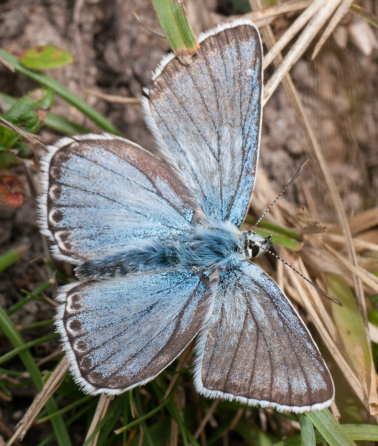
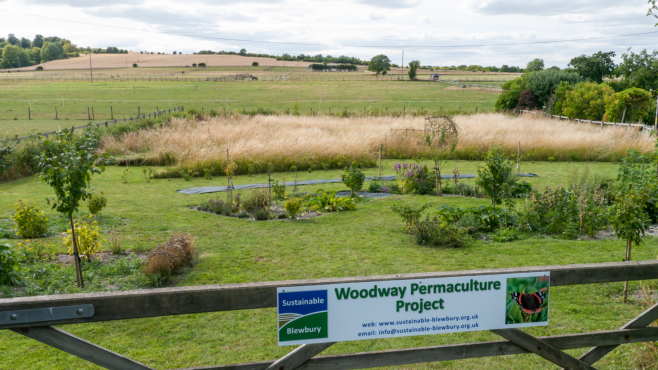
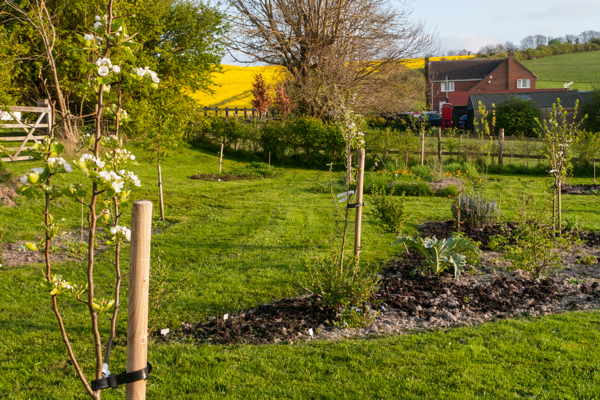
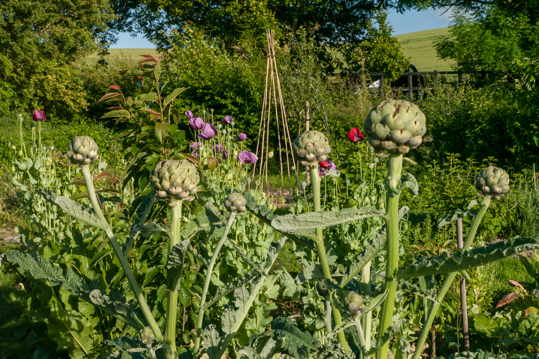
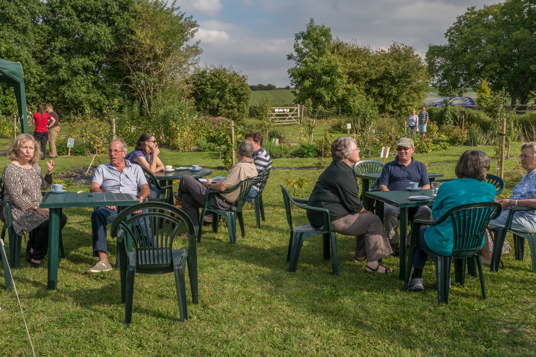
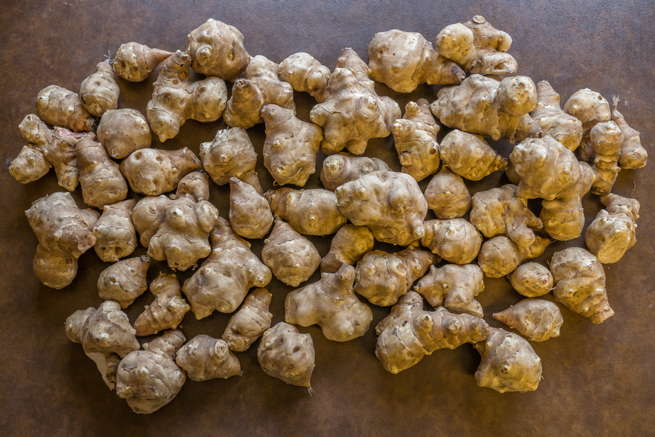
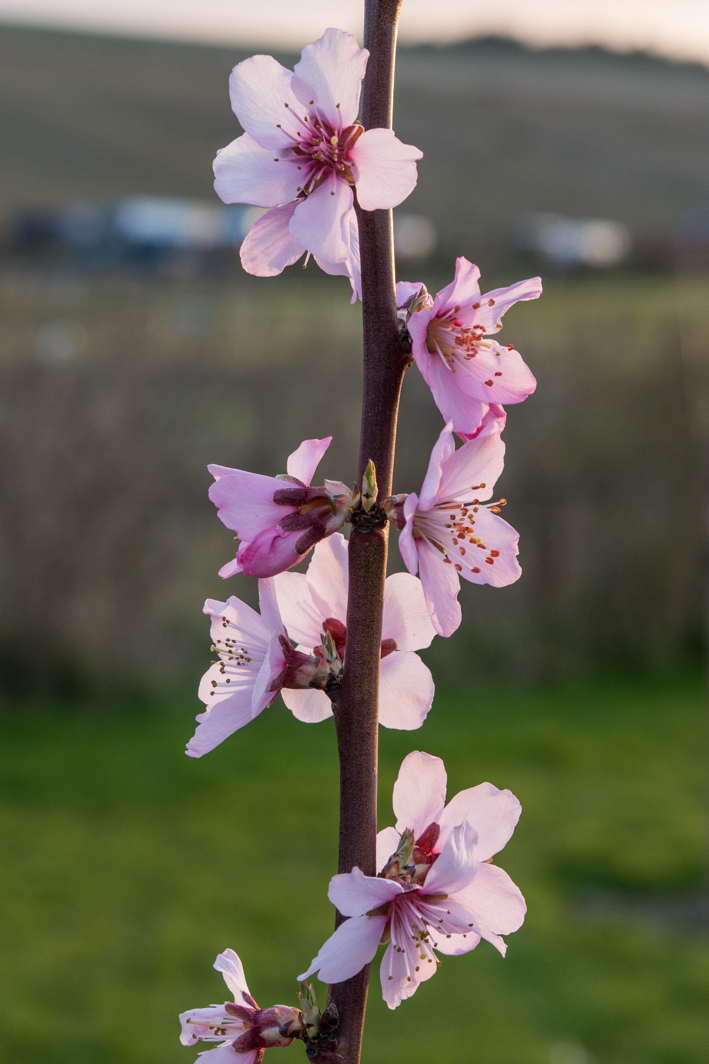
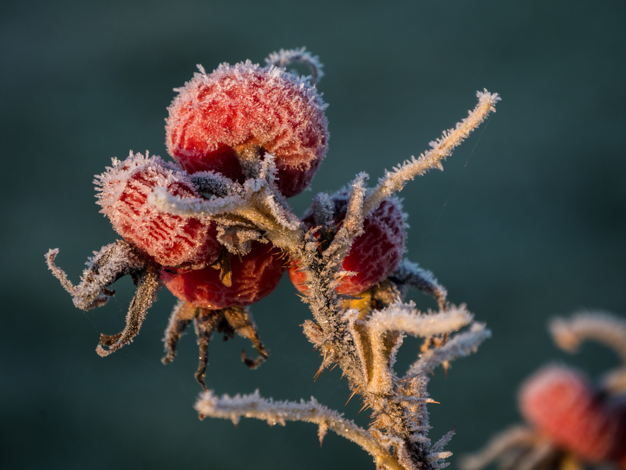
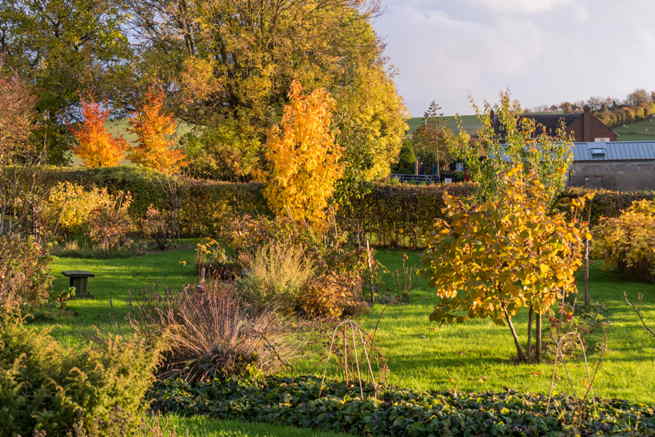
Community Orchard project
We have planted a new community orchard on Tickers Folly Field. Full information is on our Community Orchard page.
Orchard survey
As part of Apple Day, we conducted a survey of apple orchards and other fruit trees in the village. Results of the survey, notably the 57 varieties (!) of apple grown in Blewbury, are summarised on a separate page.
We held an "Apple Day" on 16 October 2010 to celebrate the abundance of food produced locally – see our events page for more information.
In 2011 we borrowed apple juicing equipment and held some public events to produce juice from trees in the village.
For 2012 we purchased our own equipment (apple shredder – left of centre, apple press – right of centre, and pasteuriser – right) and held three very successful apple juicing days (despite a poor apple crop).
In 2013, with a huge apple crop, things really took off with half a dozen public sessions and quite a few people hiring the equipment to juice their own apples at home.
The 2014 apple crop was very mixed – some people got good crops but others got very little. We had apple juice pressings on eight Saturdays. On 11 October we had an Apple Day celebration at the Red Lion. This included the Blewbury Garden Market, apple juice pressing and a VPA plant and cake stall, as well as colourful artwork by the Playgroup children and Q Gardens providing apple-flavoured ice-cream.
The 2015 apple crop was huge, and in six sessions we pressed nearly a tonne of apples. We also hired out our equipment more than ever before.
In 2016 we again held six sessions, including an Apple Day at the Red Lion, a session at the School, and another in the churchyard combined with their harvest festival. We also hired out our equipment. Apple juice made from windfalls at the Manor, where our equipment is stored, has become the soft drink of choice at Sustainable Blewbury events.
The 2017 season had a huge apple crop. We again held six sessions, including the Red Lion Garden and the School. Income was at a record level, and included many private hires. We also demonstrated making apple juice at Windale Primary School in Blackbird Leys, Oxford. People came from as far away as Wheatley and near Witney to juice their apples.
In 2018 the late spring, a badly timed frost, and the hot, dry summer produced a very mixed crop of apples: some trees did very well, others had nothing. Apple juicing was successful, but total usage of the equipment was about half of what it had been in 2017.
2019 was very mixed. Our public sessions were reasonably well-attended, but there were few private hires. Some people reported huge apple crops, others who usually have had big crops had almost nothing.
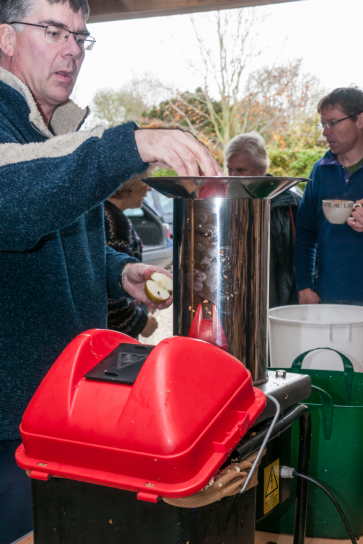
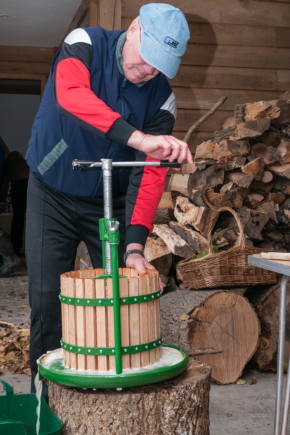
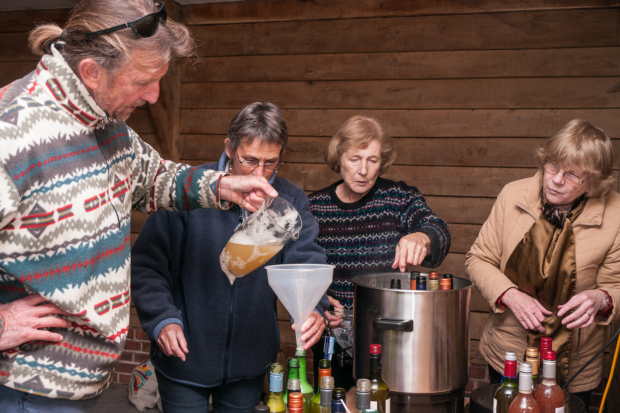
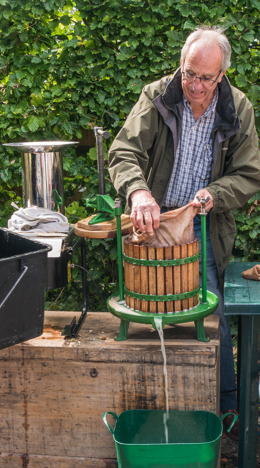
In each of 2020 and 2021 we had five public sessions at the Manor, and also some private hires. Throughput at our public sessions was improved by having a third pasteuriser, as the long time needed to pasteurise has always been a bottleneck. The 2021 crop was fairly good, though again late-spring frosts did some damage.
Locally produced food and drink
We list below a selection of interesting local producers and sources near Blewbury.
Savages – Blewbury OX11 9HB, 01235 850352, www.savagesblewbury.co.uk. Blewbury’s own greengrocer and garden shop stocks an increasing range of local produce.
Q Gardens – Milton Hill, Steventon OX13 6AB, 01235 820988, www.qgardenshop.co.uk. Their own fruit, vegetables, meat and ice cream as well as many other local products. A fine selection of British cheeses at good prices. Pick your own fruit.
The Old Farm Shop – Milton Hill, Harwell OX14 4DP, 01235 831247, www.theoldfarmshop.co.uk. Eggs, lamb, poultry and game, unsprayed fruit and vegetables.
Brightwell Vineyard – Shillingford Road, Wallingford OX10 8LJ, brightwellvineyard.co.uk. White, rosé, red and sparkling wines.
Blewbury Bread Company – Locally-produced, delicious sourdough. blewburybread.co.uk. Blewbury-crafted sourdough bread and a variety of innovative pastries.

Ethical shopping
Look for the Fairtrade logo on food products. Fairtrade is an approach to growers that promotes long-term, sustainable development and fairer treatment of the poor and disadvantaged around the world.

